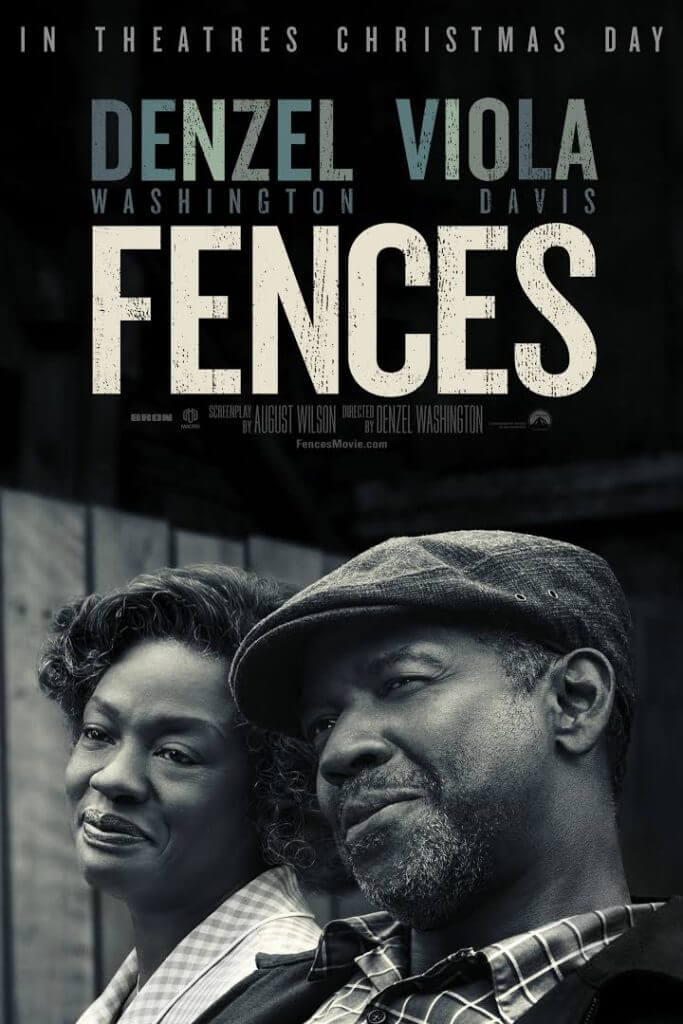Pittsburgher August Wilson wrote his award-winning play, Fences, in 1983. Fences was the sixth of ten plays in his “Pittsburgh Cycle” focusing on the changing nature of race relations and the African American experience. Recently, Denzel Washington directed and starred in a movie version shot in Pittsburgh.
While the play was awarded the 1987 Pulitzer Prize and multiple Tony Awards (including Best Actor and Best Actress in a play to both Denzel Washington and Viola Davis in the 2010 revival), the movie as a whole falls flat.
Fences is set in Pittsburgh in the mid-1950’s. It tells the story of Troy Maxson, a charismatic if deeply flawed man, and his wife Rose, a dutiful and devoted housewife and mother, as they raise their teenage son. The movie opens as Troy is punching out of his shift on a Friday afternoon, jubilant that another hard week is over. This joyous atmosphere continues with some risqué back and forth teasing between husband and wife. Troy’s sweetness and obvious devotion to his wife of 18 years overlies hints of the tragedy that is to come.
Troy is an aging ex-con turned baseball player who is barely scraping by as a city trash collector. As the story continues, we learn of Gabe, Troy’s disabled brother, who returned from the war severely brain damaged and with a metal plate in his head. It is only because of Gabe’s disability and the $3000 check from the government that Troy is able to provide for his own family.
Troy’s guilt over these circumstances is a recurring theme throughout the movie, as are the destructive effects of institutionalized racism. Troy is portrayed as an intelligent man, determined to succeed in his occupation despite the obstacles.

In one scene, frustrated and embittered by a lifetime of inequality, Troy asks his supervisor why Pittsburgh had no Black sanitation drivers. To everyone’s astonishment, he was not fired for insubordination, but rather was given the first such promotion in the city. He gains a sense of pride and self-worth in a society that would rather he had none.
Despite Troy’s obvious intelligence, he has a destructive streak of self-pity and is so enmeshed in his past personal struggles that he can no longer see or accept that things are beginning to change for the better. He is a loving husband and father who masks his love for his son Corey with a toughness and authoritarianism that could be mistaken for cruelty.
At one point in the movie a talent scout comes to watch Corey play football and possibly offer him the chance to further his education and play professional sports. In his jealousy and refusal to believe that times are changing, Troy squashes his son’s hopes and dreams, thus condemning his son to the lifestyle he claims to not want for him.
Troy truly wants to see his son do well, but he only succeeds in estranging him as he delivers this crushing blow: “You live in my house… sleep on my bed clothes…fill you belly up with my food… cause you my son. You my flesh and blood. Not ‘cause I like you! Cause it’s my duty to take care of you. I OWE a responsibility to you! Let’s get this straight right here… before it go along any further… I ain’t got to like you.”
About three quarters of the way through the movie, the once charming (if sometimes cruel) man commits a devastating mistake that leaves the audience gasping.
At this point in the movie Viola Davis delivers a truly outstanding performance in her portrayal of the direct and plain-spoken Rose whose struggle to understand her husband leaves her overcome with grief. This stunning performance left most of my fellow audience-goers sniffling and trying to discretely wipe away their tears.
It is here that the audience realizes that this once charismatic man has become, in essence, a shell of his former self. He has betrayed his family and lost their respect and admiration and must struggle with the consequences of his actions.
Despite the superb direction and acting, the movie falls somewhat flat because of its failure to use the singular ability of cinematography to transport the audience into another realm. I could never quite get over the feeling that this is a play that was, almost as an afterthought, turned into a film.
It’s an important movie to see, though, and I would highly recommend going to see it, if for no other reason than to glimpse life from the other side of the fence.
Read the book before you see the movie
Request FencesWhitney Z. is a native Pittsburgher. She is currently a substitute Library Assistant who loves audiobooks, music and movies. She believes firmly that NASA made a mistake in demoting Pluto and would sincerely like for said decision to be reversed.

